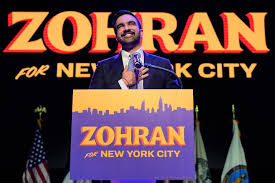What. A. Speech.
We need to pause here for a moment.
Talk about relatability. Talk about inclusivity. Talk about keeping it real. Talk about being smart. VERY smart.
Is there anyone Zohran Mamdani didn’t talk about? Anyone he didn’t connect with? Anyone he didn’t touch? From describing the daily struggles of people on the streets to narrating real-life experiences and sharing stories from his time as a commoner: his speech was layered, lived, and real.
The vivid details painted on that podium were more than words; they were portraits of resilience: “Fingers bruised from lifting boxes on warehouse floors, palms calloused from delivery bike handlebars, knuckles scarred by kitchen burns.”
We all felt it. We all felt the pain, and many of us subconsciously looked at our own hands for comparison, for relatability. Brilliant work for getting us involved and making us part of it, Zohran!
And then, the next line hit like a drumbeat. It was sharp, deliberate, unforgettable
“These are not hands that have been allowed to hold power.” Epic.
The rhythm of his vocal delivery was powerful and precise. Every repetition, every pause, every “you” was intentional, deliberately crafted to draw the listener closer. His word choice carried weight and cadence; his was loud, he was clear. He was rhythmic.
Focusing particularly on immigrants; New York’s beating heart, he made it deeply personal. He spoke of them, as one of them: the Mexican abuela (grandma), the Ethiopian auntie. He spoke about them like they were his own, like he was familiar with them, like he belonged.
He touched on trans communities, people of color, Jews, Muslims. He referenced churches, spoke a few words in Arabic, and declared,
“I am from you and for you.”
Then, in a tender moment, he called his wife “hayati” – my life in Arabic. I mean, wow.
He spoke unapologetically about his beliefs and values:
“I am Muslim. I am a democratic socialist.”
He nodded to his multicultural roots, quoting American socialist and activist Eugene Debs, and Jawaharlal Nehru, India’s first prime minister. Who is left out? What is left unsaid? None.
And if you were counting the number of times he said ‘you’; I bet you’ve lost track.
“You showed.” “You dared.” “You reached for something greater.”
Then came the crescendo – the collective call, ‘We’
“We will fight for you, because we are you.”
Or, as they say on Steinway Street,
Ana minkum wa alaikum – I am from you and with you.
A line that resonates deeply with the people of Steinway, a Queens neighborhood known for its high concentration of Middle Eastern shops, restaurants, cafés, and hookah lounges, home to Egyptian, Lebanese, Syrian, Moroccan, and Tunisian immigrants and their descendants. In other words, his people. He spoke to them in their language, and like he was one of them.
This was more than a victory speech. It was rhythm, recognition, and reclamation. A masterclass in how language, words and vocal delivery can unite.
Zohran Mamdani didn’t just deliver a speech. He delivered a ‘movement’ in words. He moved people mentally and emotionally, he sparked physical action and inspired a new generation of leaders.
This is a speech to go in the books – one that will be studied, quoted, and remembered for how well it was crafted and delivered, and how it it moved hearts and minds.





